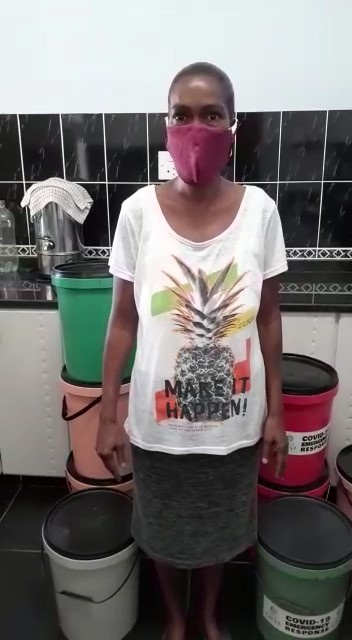
Nadia lives in Mariannridge near Pinetown in Durban and has faced severe challenges since the outbreak of the Covid-19 coronavirus and the government enforced national lockdown.
As the community awaits public testing for the virus, food-wise, she has absolutely nothing having depleted her supplies for the past four weeks of lockdown.
To make things worse, food prices in her area have risen significantly. The food parcel she received from the non-governmental organisation Cast will go a long way in helping to feed and sustain her family.
The lockdown has left literally hundreds of thousands of families such as Nadia’s in deep crisis: food has run out, no one in the family is able to earn any money, basic health is becoming a concern and the children’s education is falling further behind.
This, in turn, has resulted in sharply increasing psycho-social issues.
A recent survey conducted by the SA Depression and Anxiety Group on Covid-19 and mental health, found that 55% of the 1 214 respondents had suffered anxiety and panic attacks during the lockdown.
Read: How South Africans can deal with the psychological impact of social isolation
At least 46% were under financial stress and pressure; 40% are experiencing depression; 30% had poor family relations; 12% had experienced feelings of suicide and 6% admitted to abusing substances.
Read: Coping mentally during self-isolation
This feedback can be understood as a reflection of the broader population, where all the above problems are known causes feeding into the poverty vortex that is consuming the simple hopes and dreams of the poor, leaving them even more powerless than before.
Cast is one of many registered NGOs operating across the country. They are providing help to South Africa’s most vulnerable communities during the lockdown.
The organisation partners with local churches to provide critical services to the poorest households in 13 communities across KwaZulu-Natal and Gauteng.
Cast has been issued with essential services permits and, from just before the lockdown last month to date, has delivered more than 750 food parcels, providing about 84 000 meals to almost 4 000 people. This will continue into next week as the crisis deepens.
Cast’s Covid-19 food parcels include maize meal, beans, samp, soya mince, peanut butter, cooking oil, fortified porridge, flour, soap and face masks.
Since the lockdown, Cast has suspended its other regular community development programmes. These include child literacy, creative arts, sports, youngsters resilience and micro-business development and support.
However, community workers and volunteers continue to connect through social media with the people they have been assisting with continued training, information sharing and psycho-social support.
For example, Janet Okoye, Cast’s business development leader, has now initiated WhatsApp-based community business forums where information and training are shared regarding doing business during Covid-19 lockdown and beyond.
These also serve to reconnect people, inspire hope for the future and practically assist micro-entrepreneurs in getting financial help.
Administrative and programme staff have been busy developing new strategies and curricula for a post-lockdown response. The main crises that Cast staff are planning to address to the end of this year are the devastation of local economies – by helping small business owners restart their enterprises successfully and those who’ve lost jobs, become re-employed or start their own businesses.
For young children who have fallen behind academically, Cast will be doubling the impact of its basic literacy with primary schools. It will expand the resilience development work with at-risk youngsters to tackle depression and hopelessness and increase the number of psycho-social support groups for addicts and their families.
The nutritional and basic health support for indigent households will continue through the provision of food parcels, health screening and distribution of chronic medication in partnership with the health department.
Experts are forecasting that social distancing and lockdowns will increasingly affect us all in the future. This requires NGOs such as Cast to adapt their strategies and systems to accommodate for this “new normal”.
Thus as a further strategic shift, Cast is currently raising funds for the development of an online training and support platform which will allow training, tutoring and mentoring to be done both online as well as face to face.
This is important, not only because it opens the opportunities to rapidly expand Cast’s work into new areas and access new volunteers who may be far away, but it also means that no lockdown or school closure will ever prevent vulnerable people from receiving training, mentorship and support.
Dr Armand Bam, head of social impact at the University of Stellenbosch Business School has noted the challenge faced by NGOs: “The impact of physical distancing will affect service delivery to beneficiaries and the ability to relate in person with donors.
While government can rely on our taxes to stay operational and well-resourced businesses tap into financial reserves, these organisations primarily rely on donations and personal fund-raising to ensure service delivery.”
Every donation will count towards continuing the work of Cast to make a lasting difference in poor communities during this time of great need.
Make a contribution or contact us at info@Cast.org.za.
* Statistics sourced from Sadag.
 | ||||||||||||||||||||||||||
Get in touchCity Press | ||||||||||||||||||||||||||
| ||||||||||||||||||||||||||
| Rise above the clutter | Choose your news | City Press in your inbox | ||||||||||||||||||||||||||
| City Press is an agenda-setting South African news brand that publishes across platforms. Its flagship print edition is distributed on a Sunday. |




 Publications
Publications
 Partners
Partners









